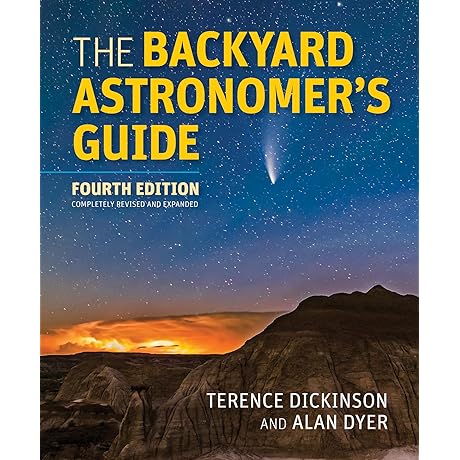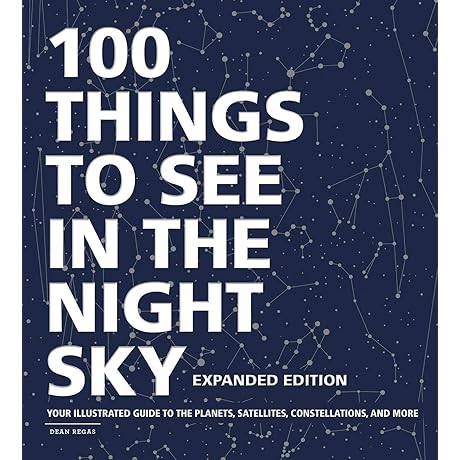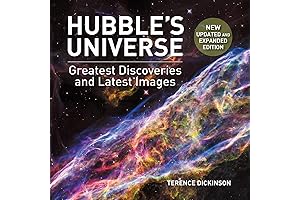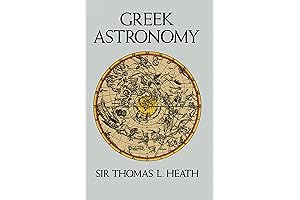· astronomy books · 13 min read
Top 10 Best Books on Astronomy in 2024: Explore the Cosmos
Discover the wonders of space with our curated list of the best books on astronomy. From beginner-friendly guides to in-depth explorations, we've got you covered.
Embark on an astronomical journey with our top picks for the best books on astronomy. Whether you're a novice stargazer or a seasoned space enthusiast, these books will captivate your imagination and deepen your understanding of the cosmos.
Overview

PROS
- Detailed star charts for both hemispheres.
- Easy-to-understand explanations of astronomy concepts.
CONS
- May not be comprehensive enough for advanced astronomers.
- Small size may limit usability.
The National Geographic Stargazer Atlas is a compact and user-friendly guide to the night sky. Its detailed star charts, covering both hemispheres, make it easy to identify constellations, planets, and other celestial objects. The accompanying text provides clear explanations of astronomy concepts like celestial coordinates and timekeeping, making it accessible to both beginners and experienced stargazers. The atlas's pocket-sized format makes it a convenient companion for camping trips, backyard stargazing, or any other outdoor adventure.
While the Stargazer Atlas is an excellent resource for casual stargazers, seasoned astronomers may find it lacking in depth. The star charts are not as detailed as those found in larger, more comprehensive atlases, and the text covers only basic astronomy concepts. Additionally, its compact size can make it challenging to read and use in low-light conditions.

PROS
- Comprehensive guide to astronomy for beginners and enthusiasts
- Stunning celestial photography and illustrations
- Easy-to-understand explanations of astronomical concepts
- Detailed star charts and constellation guides
- Perfect for backyard stargazing and astrophotography
CONS
- Can be overwhelming for complete beginners
- Some advanced topics may require further research
Immerse yourself in the enchanting world of astronomy with the National Geographic Backyard Guide to the Night Sky, 2nd Edition. This comprehensive guide invites you to explore the wonders of the night sky, from the basics of astronomy to detailed explorations of constellations and celestial objects. With captivating images, clear explanations, and practical tips, this book empowers you to navigate the cosmos like a seasoned stargazer.
Discover the secrets of the universe as you explore star clusters, nebulae, galaxies, and planets. Learn about observing techniques, astrophotography, and the history of astronomy. Whether you're just starting your astronomical journey or seeking to deepen your knowledge, this guide is an invaluable companion for unforgettable nights under the starry sky

PROS
- Exceptional clarity in explaining complex astronomical concepts, making them accessible to learners of all levels
- Impressive depth and breadth of coverage, encompassing a vast array of astronomical phenomena
CONS
- Can be overwhelming for absolute beginners due to the extensive content
- Some sections may require prior knowledge in physics or mathematics for full comprehension
Embark on an extraordinary journey through the cosmos with the eighth edition of Astronomy: A Self-Teaching Guide. This comprehensive guidebook serves as your ultimate companion, illuminating the intricacies of celestial bodies and astronomical phenomena.
With remarkable clarity, the book unravels complex scientific principles, making them accessible to aspiring astronomers and seasoned space enthusiasts alike. Its content spans the vast expanse of astronomy, from the birth of stars to the formation of galaxies.

PROS
- Comprehensive guide for astronomy enthusiasts of all skill levels, offering a comprehensive overview of celestial phenomena.
- User-friendly and accessible language, de-mystifying complex astronomical concepts, making them easy to understand.
CONS
- Lacks in-depth coverage of advanced astronomical theories and techniques.
- Could benefit from more interactive elements and illustrations to enhance the learning experience.
Immerse yourself in the enchanting tapestry of the night sky with 'The Backyard Astronomer's Guide'. This beginner-friendly guide unlocks the secrets of the cosmos, empowering you to navigate the celestial sphere like a seasoned stargazer. Its clear and engaging prose demystifies the wonders above, making even the most intricate astronomical concepts accessible to all. Whether you're an aspiring astronomer or simply curious about the celestial tapestry, this guide is an invaluable resource for your cosmic exploration.
While it may not delve into the deepest realms of astrophysics, 'The Backyard Astronomer's Guide' provides a solid foundation for understanding the fundamentals of astronomy. It ignites a fascination for the celestial bodies that grace our night sky, from the shimmering stars to the distant galaxies. With its easy-to-follow approach, this guide will transform your backyard into an observatory, fostering a profound appreciation for the boundless wonders of the universe.

PROS
- Comprehensive and visually stunning exploration of astronomy, from the history of astronomy to the latest scientific discoveries
- Captivating imagery, including photographs, illustrations, and diagrams, that bring the wonders of the universe to life
- Engaging narratives that make complex astronomical concepts accessible and enjoyable
CONS
- Some sections may be too detailed for casual readers
- The sheer amount of information can be overwhelming at times
Journey through the vast expanse of the universe with The Astronomy Book (DK Big Ideas), a captivating guide that unveils the captivating wonders of astronomy. From the early pioneers of the field to the cutting-edge discoveries of modern times, this comprehensive volume immerses readers in the history and science of astronomy. Immerse yourself in a symphony of images, including stunning photographs, captivating illustrations, and illuminating diagrams, that bring the celestial bodies to life. Explore the birth, evolution, and enigmatic properties of stars, the formation and diversity of galaxies, and the mystifying nature of black holes.
Written in an engaging and accessible style, The Astronomy Book (DK Big Ideas) makes complex astronomical concepts comprehensible and enjoyable for enthusiasts of all levels. Let this definitive visual exploration ignite your passion for the cosmos and leave you starstruck with awe and wonder.

PROS
- Packed with captivating images, detailed maps, and fascinating facts that bring celestial wonders to life.
- A comprehensive guide for stargazers of all levels, from beginners to seasoned enthusiasts.
CONS
- May require a basic understanding of astronomy for optimal comprehension.
- Some images could benefit from higher resolution.
Embark on an awe-inspiring journey through the cosmos with '100 Things to See in the Night Sky, Expanded Edition.' This richly illustrated guide unveils the secrets of celestial wonders, inviting you to explore the vast expanse of our universe. With stunning photographs, intricate maps, and engaging narratives, it transports you to distant galaxies, introduces you to intriguing planets, and unravels the mysteries of constellations.
As you delve into its pages, you'll discover fascinating facts about the sun, moon, and planets. Learn about the composition of stars, the evolution of galaxies, and the captivating history of astronomy. Whether you're a budding stargazer or a seasoned enthusiast, this book will ignite your passion for the cosmos and deepen your understanding of the celestial wonders that adorn our night sky.

PROS
- Captivating exploration of the cosmos through stunning Hubble telescope images.
- Seamless blend of scientific insights and awe-inspiring visuals.
CONS
- Some technical details might be challenging for casual readers.
- May not provide the most cutting-edge research for professional astronomers.
Immerse yourself in the breathtaking wonders of the cosmos with 'Hubble's Universe: Your Complete Guide to the Greatest Discoveries and Latest Images of Astronomy.' This captivating book unveils a comprehensive visual tapestry of the universe, showcasing the groundbreaking discoveries made possible by the legendary Hubble Space Telescope. Prepare to be amazed as you delve into a treasure trove of spectacular images that have transformed our understanding of the cosmos.
From the ethereal Pillars of Creation to the enigmatic Black Holes, each celestial marvel is meticulously captured and accompanied by expert insights. 'Hubble's Universe' strikes a perfect balance between scientific rigor and captivating storytelling, making it an ideal companion for both astronomy enthusiasts and curious minds seeking an awe-inspiring exploration of our cosmic neighborhood. Let this book guide you on an unforgettable journey that will redefine your perception of the vast and enigmatic universe we inhabit.

PROS
- Comprehensive guide to astronomy basics, tailored for beginners.
- Engaging and accessible writing style, making complex concepts easy to grasp.
CONS
- May not be suitable for advanced astronomy enthusiasts seeking in-depth knowledge.
- Lacks references or citations for further exploration.
Embark on an astronomical journey with 'Astronomy For Beginners,' a comprehensive guide that unveils the mysteries of the cosmos. Written in an approachable and engaging style, this book caters to aspiring astronomers seeking to unravel the wonders of space. From the vastness of galaxies to the intricate details of celestial bodies, this guide leads you through an awe-inspiring exploration of the universe. However, for seasoned astronomy enthusiasts seeking more advanced knowledge, this book may not fully satisfy their thirst for in-depth exploration.
The strength of this guide lies in its ability to demystify complex astronomy concepts, making them accessible to novice readers. With its clear explanations and captivating storytelling, the book sparks a passion for astronomy, encouraging readers to delve deeper into this fascinating field. While the lack of references or citations may limit its suitability for academic research, it remains an invaluable resource for those taking their first steps into the realm of astronomy.

PROS
- Explosively deep exploration of astronomical concepts
- Engaging, narrative-driven style that sparks curiosity
CONS
- Could benefit from more visual aids and diagrams
- Some scientific terminology may challenge novice readers
Prepare to venture into the captivating world of astronomy with 'Cosmic Queries: StarTalk's Guide to Who We Are, How We Got Here, and Where We're Going'. Neil deGrasse Tyson, renowned astrophysicist and science communicator, unravels the enigma of our universe through an intriguing conversational style. Each chapter delves into fundamental astronomical concepts, from the nature of light to the enigma of black holes. Enriched with personal anecdotes and accessible language, Tyson makes the complexities of astrophysics approachable, enticing readers of all backgrounds.
However, this celestial voyage is not without its quirks. The absence of visual aids, such as diagrams or illustrations, may pose a challenge for readers seeking a more immersive experience. Additionally, novice astronomy enthusiasts may encounter some scientific jargon that could slow their understanding. Despite these minor drawbacks, 'Cosmic Queries' remains an invaluable resource for astronomy enthusiasts seeking a comprehensive and engaging exploration of the universe's grand tapestry.

PROS
- Delivers a historic appraisal of Greek astronomy, delving into the influential ideas and theories of ancient thinkers.
- Suitable for a range of readers, from astronomy enthusiasts to historians seeking to understand the roots of scientific thought.
CONS
- Lacks in-depth exploration of modern astronomy
- May require additional research for readers seeking comprehensive knowledge on the subject
Embark on an illuminating journey through the celestial tapestry woven by ancient Greek minds in "Astronomy Illuminated: Greek Astronomy and Cosmology." This captivating work unveils the profound impact of Greek scholars on our understanding of the cosmos.
Through meticulous research and insightful analysis, the author paints a vibrant portrait of Greek astronomy's evolution. From the mythological origins of celestial bodies to the sophisticated mathematical models developed by Eratosthenes and Aristarchus, the book delves into the groundbreaking ideas that shaped our perception of the universe. An accessible and engaging read, "Astronomy Illuminated" is an invaluable resource for astronomy enthusiasts, historians, and anyone seeking to trace the origins of scientific thought.
Our selection includes comprehensive guides that delve into the mysteries of the night sky, practical manuals for backyard astronomers, and thought-provoking explorations of the universe's origins and our place within it. These books will fuel your curiosity and inspire you to gaze up at the stars with a newfound appreciation for their beauty and wonder.
Frequently Asked Questions
What are some of the best books for beginners in astronomy?
For beginners, we recommend 'National Geographic Backyard Guide to the Night Sky' and 'Astronomy For Beginners' for their clear and accessible introductions to the wonders of the cosmos.
Can you suggest books that provide in-depth explorations of the universe?
For a deeper dive into astronomy, consider 'Astronomy: A Self-Teaching Guide' and 'The Astronomy Book (DK Big Ideas).' These books offer comprehensive overviews of cosmic phenomena and the latest scientific discoveries.
What books can help me identify celestial objects in the night sky?
'National Geographic Stargazer's Atlas' and '100 Things to See in the Night Sky' provide detailed star charts and guides to help you navigate the night sky and identify planets, constellations, and other celestial wonders.
Are there any books that discuss the history and cultural significance of astronomy?
'Greek Astronomy' offers a fascinating exploration of the origins of astronomy and its role in ancient civilizations, while 'Cosmic Queries' delves into the philosophical and cultural implications of our understanding of the universe.
What's the best book for backyard astronomy enthusiasts?
'The Backyard Astronomer's Guide' provides practical tips and techniques for observing the night sky from your own backyard, including equipment recommendations and observing techniques.













